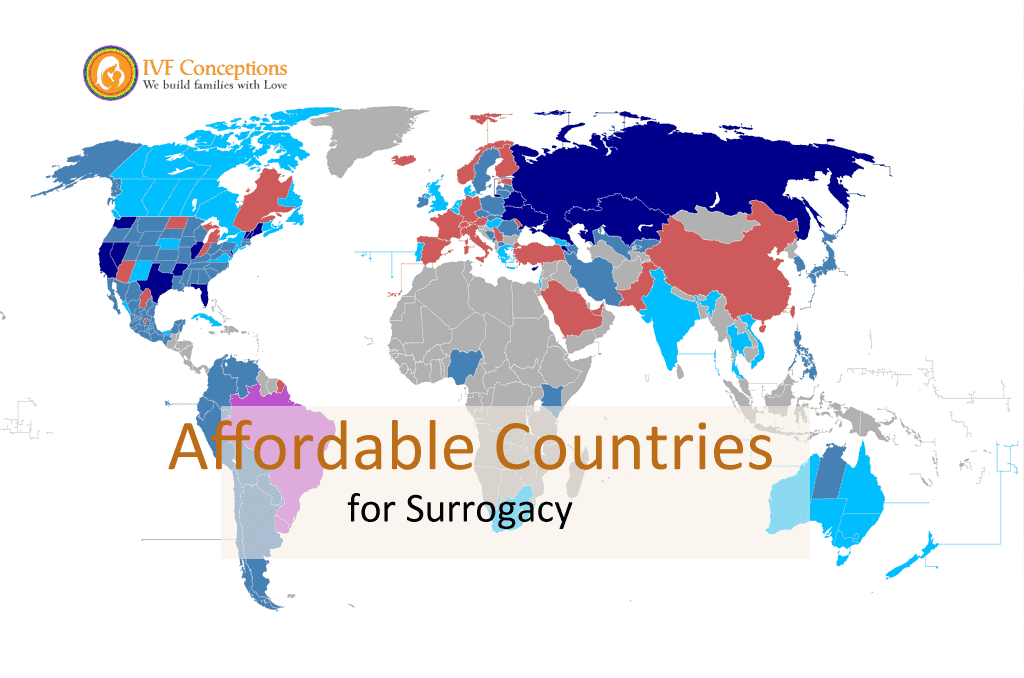Surrogacy Pros and Cons for Intended Parents and Surrogate Mothers

Gestational Surrogacy, is a method of assisted reproduction method, where involves a woman carrying a pregnancy and giving birth on behalf of another individual or couple. Surrogacy offers a unique opportunity for intended parents and gestational carriers, but it’s essential to consider both the advantages and challenges before embarking on this journey.
In this comprehensive guide, we will explore the pros and cons of surrogacy, shedding light on the various aspects involved.
Children are the apple of their parent’s eyes. Children not only make you experience parenthood but also help you to feel complete. But what about couples who are childless? Who comes to their rescue? For them, gestational Surrogacy is the best option to fulfill their dream of parenthood.
According to the data by the Society for Assisted Reproductive Technology (SART) when a surrogate is pregnant, there are 95% chances of successful births in the USA. Although it is a pretty encouraging number, let’s discuss further the risks and benefits of surrogacy for intended parents.
Get in touch for a Free Surrogacy Consultancy:
📲 +91-8800481100 ( WhatsApp, Line, Viber)
 Types of Surrogacy
Types of Surrogacy
Surrogacy can be categorized into two main types: traditional surrogacy and gestational surrogacy. It is important to understand the distinctions between these two types before delving into the pros and cons.
Traditional Surrogacy
Traditional surrogacy, also known as partial, natural, or straight surrogacy, involves the surrogate using her own eggs for pregnancy. In this type of surrogacy, the surrogate’s eggs are inseminated with the sperm of an intended parent or donor. The surrogate is genetically related to the child she carries, which can lead to ethical and legal complexities. Due to these concerns, traditional surrogacy arrangements are less common.
Gestational Surrogacy
Gestational surrogacy is the more prevalent option in contemporary surrogacy arrangements. In gestational surrogacy, the surrogate, also known as a gestational carrier, does not have a genetic connection to the child she carries. The embryo is created through in vitro fertilization (IVF), using the eggs and sperm of the intended parents or donors. The resulting embryo is then transferred to the gestational carrier’s uterus. This type of surrogacy is considered less legally complicated, as the genetic connection lies with the intended parents.
More resources for your surrogacy journey:
Surrogacy pros and cons for surrogate mother
Surrogacy For Gay Couples Made Easy And Affordable
Guaranteed Surrogacy Baby Program: An Overview

Surrogacy Pros and Cons for Intended Parents
Surrogacy is a complex and deeply personal journey for many couples and individuals struggling with infertility. It offers a ray of hope and a path toward parenthood, but it’s important to understand both the advantages and disadvantages before embarking on this path.
Pros of Surrogacy for Intended Parents
|
Pros |
Explanation |
|
1. Biological Parenthood |
Surrogacy enables couples to have a child who is biologically related to one or both parents. This is especially significant for those who cannot carry a pregnancy themselves. |
|
2. Gestational Surrogacy |
In gestational surrogacy, the surrogate is not biologically related to the child, which can help bypass legal and emotional complications. |
|
3. A Solution for Medical Conditions |
Couples facing medical conditions that prevent pregnancy may find surrogacy as their best option. |
|
4. Genetic Diversity |
Surrogacy allows for the option of using egg or sperm donors, offering genetic diversity and choice. |
|
5. Control Over Pregnancy |
Intended parents have control over the prenatal environment, ensuring the health of the baby. |
There are some positives of surrogacy as below:
-
Completing families: Surrogacy provides a solution for individuals and couples who have struggled with infertility, members of the LGBTQ+ community, and those with medical conditions that make pregnancy unsafe. It offers the opportunity to create a family and experience the joys of parenthood.
-
Genetic connections: Gestational surrogacy allows intended parents to maintain a biological relationship with their child. This enables the passing down of genetic traits and fosters a profound sense of connection within the family.
-
Building relationships: Many intended parents develop meaningful bonds with their surrogates and their families during the surrogacy process. These relationships can last a lifetime, creating an extended support system for the child.
-
Predictability and control: Surrogacy involves the establishment of a legally binding contract, outlining everyone’s expectations and responsibilities. This provides clarity and ensures that all parties involved are aware of what to expect throughout the surrogacy process. Intended parents have greater control and involvement in the pregnancy journey.
-
Active participation: Intended parents can actively participate in the surrogate’s pregnancy, attending key appointments and sharing important milestones, such as embryo transfer and birth. This involvement strengthens the emotional connection with the child.
-
Higher success rates: Surrogates have a proven track record of carrying healthy pregnancies, which often increases the chances of success compared to fertility treatments alone. Also, according to SART, 75% of the surrogates conceives the child to succeed in the USA.
Cons of Surrogacy for Intended Parents
|
Cons |
Explanation |
|
1. High Cost |
Surrogacy can be expensive, involving fees for the surrogate, legal expenses, and medical bills. |
|
2. Emotional Challenges |
Both the intended parents and the surrogate may face emotional challenges throughout the process. |
|
3. Legal Complexities |
Surrogacy laws vary by location and can be intricate, leading to potential legal complications. |
|
4. Health Risks |
Pregnancy carries inherent health risks, and surrogates may face complications. |
|
5. Ethical Concerns |
Some people have ethical concerns about commercial surrogacy, as it involves financial transactions. |
-
Complexity and legal considerations: Surrogacy involves intricate medical procedures and navigating surrogacy laws, which can be overwhelming for intended parents. Working closely with a trusted professional, like [Your Company Name], ensures a safe and legally compliant process.
-
Financial costs: Average surrogacy costs in the USA range from $150,000 and above, which can be expensive due to the various services and professionals involved. Intended parents should be prepared for the financial commitment associated with surrogacy. The cost of surrogacy for the intended parents can be overwhelming most of the time. It is a costly medical procedure and requires compensation for the surrogate and egg donor.
-
Relinquishing control: While intended parents generally have more control compared to adoption, they still need to trust the surrogate to carry the pregnancy. Letting go of some control can be challenging for some intended parents
-
Time consumption – It takes 1-2 years for the full gestational surrogacy process of the timeline. The surrogacy process involves lots of time both in terms of procedure and gestation of the surrogacy baby. The research time, pre-procedure time, antenatal care, and baby delivery can take more than you think! Being prepared and planning well in advance can make the surrogacy journey a bit easier.
-
Emotionally Demanding – Surrogacy can be emotionally demanding for the surrogate mother to bear a child and let go of the child at the end of the contract. For the intended parents, the journey ends with joy.
-
The medical procedure needed for the fertilization of embryos – the IVF Cycle is costly. On top of that, the legal fee is an integral part of the surrogacy process. But in case, you are looking for an affordable yet trusted surrogacy option and are not able to afford high surrogacy costs in the USA. It is possible to explore them in Eastern European surrogacy countries.
More resources for the surrogacy process:
Surrogacy vs adoptions Pros and cons
Adoption Vs surrogacy, cost explained

Surrogacy Pros and Cons for Surrogates
Gestational surrogates, who selflessly embark on the journey of surrogacy, also experience both rewards and challenges. Let’s explore the advantages and potential drawbacks of these remarkable women:
Pros of Surrogacy for Gestational Surrogates
-
Rewarding gift: Many women choose surrogacy as a way to give back to another family. The experience offers a deep sense of pride and satisfaction in knowing they played a crucial role in helping another family realize their dreams of parenthood.
-
Pregnancy experience: Surrogates often enjoy being pregnant and appreciate the opportunity to experience the joys and wonders of pregnancy, even if their own families are already complete.
-
Sense of community: Surrogacy creates a unique bond among women who have gone through the process. Gestational carriers often find a supportive community of like-minded individuals who can share experiences, advice, and support.
-
Legal protection: Gestational carriers enter into a legally binding contract with the intended parents, which clearly outlines expectations, responsibilities, and compensation. This ensures fair treatment and protection throughout the surrogacy journey.
-
Financial compensation: Surrogates receive compensation for their commitment and the physical and emotional demands of pregnancy. This compensation can be used to achieve personal goals, such as purchasing a home or funding their children’s education.
Cons of Surrogacy for Gestational Surrogates
-
Physical demands: Surrogacy involves additional medical screenings, appointments, fertility treatments, and the challenges inherent in pregnancy itself. It requires a significant physical commitment from gestational carriers.
-
Emotional challenges: Carrying someone else’s baby can be emotionally taxing for surrogates. The journey may involve heightened emotions and stress, and emotional support through counseling services, like the ones offered by [Your Company Name], can be beneficial.
-
Time commitment: Surrogacy requires a substantial time investment. Gestational carriers must attend screening appointments, meet with intended parents, and navigate the legal and medical processes. The entire surrogacy process can take a year or longer to complete.
It’s important for women considering surrogacy to carefully evaluate the pros and cons, considering their personal circumstances, support systems, and emotional well-being. Open communication, education, and support from professionals are essential during the decision-making process.
If you are a surrogate mother you should be aware of the traditional surrogacy disadvantages, like emotional attachments and legal complications.
Commercial Surrogacy Pros and Cons
Commercial surrogacy, also known as compensated surrogacy, involves a contractual agreement where the surrogate mother receives financial compensation for carrying and delivering a child for another person or couple.
Like any other practice, commercial surrogacy has its own set of pros and cons. Let’s explore the pros and cons of commercial surrogacy.
Pros of Commercial Surrogacy:
- Opportunity for Parenthood: Commercial surrogacy makes families possible for infertile childless couple and same-sex couples and give them a chance to have a child biologically related to them.
- Increased Access: It expands the options for individuals or couples who may not have other viable alternatives to start or expand their families.
- Emotional Connection: Intended parents can be involved in the pregnancy journey and form a bond with the surrogate and the unborn child, thus, allowing for a more personal and fulfilling experience.
- Financial Compensation: Surrogates receive financial compensation for their time, effort, and the physical demands of carrying a pregnancy, which can provide them with economic benefits.
Cons of Commercial Surrogacy:
- Ethical Concerns: Critics argue that commercial surrogacy commodifies the human body and may exploit vulnerable women.
- Legal Complexities: Laws and regulations regarding commercial surrogacy vary across countries and even within regions, leading to legal uncertainties and potential disputes.
- Emotional Challenges: The surrogate may experience emotional struggles when parting with the child after birth, especially if there is a strong emotional attachment.
- Potential Exploitation: In some cases, there have been reports of surrogates facing inadequate healthcare, lack of legal protection, or exploitation by intermediaries or agencies involved in the surrogacy process.

International Surrogacy Pros and Cons
International surrogacy involves intending parents seeking surrogacy services in a foreign country, often due to legal, financial, or accessibility reasons. While international surrogacy offers opportunities and benefits, it is essential to consider both the pros and cons before embarking on this path.
Pros of International Surrogacy:
- Expanded Access to Surrogacy: International surrogacy can provide individuals and couples with the opportunity to pursue surrogacy when it is legally restricted or unavailable in their home country. This option opens doors for those who may face challenges or legal barriers, allowing them to fulfill their dream of starting or expanding their family through surrogacy.
- Potential Cost Savings: Surrogacy expenses can vary significantly between countries. Opting for international surrogacy can sometimes be more cost-effective compared to surrogacy within one’s home country. Lower costs in certain regions may include medical procedures, legal fees, and surrogate compensation, making surrogacy more accessible to a wider range of individuals and couples.
- Legal and Regulatory Frameworks: Some countries have well-established legal and regulatory frameworks governing surrogacy, ensuring clear guidelines and protections for all parties involved. Intending parents may find comfort in jurisdictions with comprehensive laws that safeguard their rights and minimize potential risks throughout the surrogacy process.
Cons of International Surrogacy:
- Legal Complexities: Navigating the legal aspects of international surrogacy can be complex. Laws regarding surrogacy vary widely among countries, and it is crucial to thoroughly research and understand the legal framework in both the home country and the chosen destination. Failure to do so can lead to legal challenges, including issues with parental rights and citizenship for the child.
- Cultural and Language Barriers: Engaging in surrogacy abroad may involve cultural and language barriers that can affect communication and understanding between all parties involved.
- Ethical Considerations: International surrogacy raises ethical concerns, particularly regarding the potential exploitation of surrogate mothers and the commodification of reproductive services. It is essential to engage in responsible and ethical surrogacy practices, working with reputable agencies or clinics that prioritize the well-being and rights of the surrogate mothers, as well as the children born through surrogacy.
Conclusion
The decision to pursue surrogacy is deeply personal and life-changing. By understanding the pros and cons, intended parents and gestational carriers can make informed choices aligned with their goals and aspirations. At IVF Conceptions, we are committed to providing comprehensive support, guidance, and care throughout the surrogacy journey.
After thoroughly looking at the risks and benefits of surrogacy, the intended parents can decide what is best for them. Should they consider adoption or do a surrogacy process to become parents? Well, it is their personal decision and is based on many factors.
Making an Informed Decision
Deciding to pursue surrogacy requires thorough research and consideration of personal, financial, and ethical factors. Consulting with medical professionals, legal experts, and support networks can help intended parents navigate the surrogacy journey and make the best decision for their families.
But if intended parents wish to have a genetic link with the baby, then, surrogacy is one of the preferred ways of becoming parents. Hence, surrogacy is a viable option for intended parents to complete their family.
High surrogacy costs can be a hindrance to many parents who wish to have their own children. So, you can look out for cross-border surrogacy countries. Surrogacy in Colombia and Surrogacy in Mexico are the cheapest gay surrogacy countries with enough legal protection.
Similarly, hetero couples can opt for surrogacy in East European countries like Ukraine and Georgia for affordable and legal surrogacy countries.
Read more:
How to reduce surrogacy costs?
How Much Does Surrogacy Cost in Georiga, Tbilisi ( in 2024)?
Top 4 Cheapest Countries For Surrogacy That Parents Should Know (in 2024)
No matter what your personal preference is, we are here to help you in becoming parents. Contact us to learn more about the benefits and challenges of surrogacy and how we can assist you in building your dream family.
If you’d like to learn more about IVF, Egg Donation, or surrogacy Consulting services globally, check out the rest of our website at IVF Conceptions. We offer legally secure and affordable surrogacy consulting services for FREE.
Get in touch for a Free Surrogacy Consultancy:
📲 +91-8800481100 ( WhatsApp, Line, Viber)

FAQ About Pros and Cons of Gestational Surrogacy
Can anyone choose surrogacy as an option for starting a family?
Yes, surrogacy can be an option for individuals or couples who are unable to conceive or carry a pregnancy on their own due to various reasons such as infertility or medical conditions. However, the legal framework of each country to accept the intended parent is different.
Traditional surrogacy involves the surrogate using her own eggs to become pregnant, making her genetically related to the child. In gestational surrogacy, the surrogate carries an embryo created from the intended parents’ or donors’ eggs and sperm, so there is no genetic connection between the surrogate and the child.
There are no guarantees of success in surrogacy as the outcome depends on various factors such as the surrogate’s health, fertility treatments, and individual circumstances. Success rates can vary, and it’s important to discuss this with medical professionals and fertility experts.
Society’s acceptance of surrogacy varies across different cultures and regions. While some people embrace surrogacy as a means to help individuals and couples create families, others may have ethical, religious, or cultural reservations. Public opinion and legal perspectives on surrogacy can differ, and it’s important to be aware of the social context and legal framework in the specific jurisdiction where surrogacy is being considered.
What are the ethics of surrogacy pros and cons?More Resources:
- American Society for Reproductive Medicine (ASRM): https://www.asrm.org/
- The American Infertility Association (AIA): https://resolve.org/
- Family Equality Council: https://www.familyequality.org/
- National Center for Lesbian Rights (NCLR): https://www.nclrights.org/

 Types of Surrogacy
Types of Surrogacy